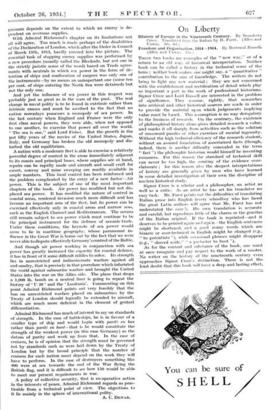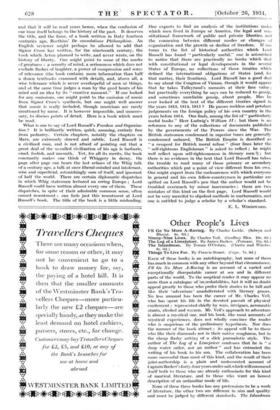On Liberty
Freedom and Organisation, 1814-1914. By Bertrand Russell. (Allen and 15s.)
THESE two books are examples of the " new way," or of a return to an old way, of historical interpretation. Neither book can be called a history in the technical sense of the term ; neither book makes. one might say, a " quantitative " contribution to the suns of knowledge. The writers do not bring to light any new material ; they are not concerned with the establishment and rectification of detail which play so important a part in the work of professional historians. Signor Croce and Lord Russell are interested in the problem of significance. They assume, rightly, that researches into archival and other historical sources are made in order to provide the material upon which judgements implying value must be based. This assumption is no way derogatory to the business of research. On the contrary, the existence of philosophical history alone gives detailed research a value, and marks it off sharply from activities such as the solution of crossword puzzles or other exercises of mental ingenuity. Without the high technical elliciency of the research student, without an assured foundation of ascertained facts (though, indeed, there is another difficulty concealed in the term " fact ") the philosophic historian would himself be inventing romances. For this reason the standard of technical skill can never be too high, the scrutiny of the evidence over- elaborate ; for this reason also the deepest interpretations of history are generally given by men who have learned in some detailed investigation of their own the discipline of modem historical study.
Signor Croce is a scholar and a philosopher, an artist as well as a critic. As an artist he has set his translator no easy task. Mr. Furst points out the difficulties of translating Italian prose into English (every schoolboy who has faced the great Latin authors will agree that Mr. Furst has not understated the case !). His own translation is accurate and careful, but reproduces little of the charm or the gravitas of the Italian original. If the book is reprinted—and it deserves to be printed again and agaln—the English sentences might be shortened, and a good many words which are bizarre or over-technical in English might be changed (e.g., " to potentiate "), while occasional phrases might disappear (e.g., " shoved aside," " a poetaster to boot ").
As for the content and substance of the book, one must at once recognize and lay respect to the work of a master. No writer on the history of the nineteenth century even approaches Signor Croce's distinction. There is not the least doubt that this book will have a deep and lasting effect,
and that it will be read years hence, when the confusion of our time itself belongs to the history of the past. It deserves the title, and the fame, of a book written in Italy fourteen centuries ago, Boethius' De consolatione Philosophiae. An English reviewer might perhaps be allowed to add that Signor Croce has written, for the nineteenth century, the book which Acton planned to write, and never wrote, on the history of liberty. One might point 'to some of the marks of greatness : a serenity of mind, a seriousness which does not exclude flashes of laughter, a power of compression and sense of relevance (the book contains more information than half a dozen textbooks crammed with detail), and, above all, a wise tolerance which is never overhopeful of men or things, and at the same time judges a man by the good hours of his mind and an idea by its " creative moment." If one looked for any omissions, one might point to the omission of music from Signor Croce's synthesis, but one might well answer that music is really included, though musician's are rarely mentioned by name. It is however impossible, and unneces- sary, to discuss points of detail. Here is a book which must be read.
What is one to say of Lord Russell's Freedom and Organisa- tion? It is brilliantly written, quick, amusing, entirely free from pedantry. Certain chapters, notably the chapters on Marx, are extremely shrewd and subtle. Lord Russell is a civilized man, and is not afraid of pointing out that a great deal of the so-called civilization of his age is barbaric, cruel, foolish, and uncouth. Yet, for all its merits, the book constantly makes one think of Whiggery in decay. On page after page one hears the last echoes of the Whig talk of a century ago, a talk at once liberal-minded and intolerant, wise and superficial, astonishingly sure of itself, and ignorant of half the world. There are certain diplomatic dispatches in which Whig statesmen lectured an erring Europe ; Lord Russell could have written almost every one of them. These dispatches, in spite of their admirable common sense, often caused resentment ; one feels just this resentment at Lord Russell's book. The title of the book is a little misleading. One expects to find an analysis of the institutions under which men lived in Europe or America, the legal and con- stitutional framework of public and private liberties, and the connexion between different modes or changes of organization and the growth or decline of freedom. If one turns to the list of historical authorities which Lord Russell has found " particularly useful," one is astonished to notice that there are practically no books which deal with constitutional or legal developments in the several States of Europe, no collections of those treaties which defined the international obligations of States (and, for that matter, their frontiers). Lord Russell has a good deal to say about the Congress -of Vienna, though -it would appear that he takes Talleyrand's memoirs at their face value ; but practically everything he says can be reduced to gossip, and sometimes unreliable gossip, about people. Has he ever looked at the text of the different treaties signed in the years 1813, 1814, 1815 ? He passes reckless and petulant judgements on the foreign policy of his own country in the years before 1914. One finds, among the list of " particularly useful books " Herr Ludwig's William II ; but there is no reference to any of the collections of documents published by the governments of the Powers since the War. The British statesmen condemned in superior tones are generally condemned unheard. The British Empire is described as " a cesspool for British moral refuse " (four lines later the " self-righteous Englishman " is asked to reflect ; he might well reflect upon self-righteousness in literary men !) ; but there is no evidence in the text that Lord Russell has taken the trouble to read many of those primary or, secondary authorities which put a point of view different from his own. One might expect from the cocksureness with which everyone in general and his own fellow-countrymen in particular are spitted on Lord Russell's pen that the author would not be troubled overmuch by minor inaccuracies ; there are two mistakes of this kind on the first page. Lord Russell would not be very merciful to slipshod methods in mathematics, and one is entitled to judge a scholar by a scholar's standard.
E. L. WOODWARD.























































 Previous page
Previous page